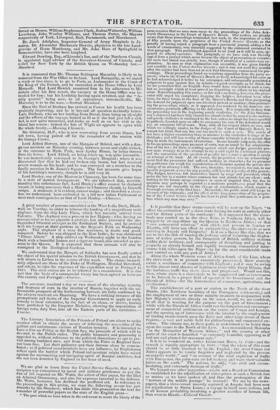It is rumoured that Mr. Thomas llabington Macaulay is likely
to be removed from the War Office to Ireland. Lord Normanby, as we stated a week or two since, is to go to Paris, as Ambassador to the Court of the King of the French, and he succeeded at the Home Office by Lord Morpeth. Had Lord Howick remained firm in his adherence to Mi- nisters after his first revolt, the vacancy at the Home Office was in- tended for him ; but his Lordship having again revolted, and the " fa- mily quarrel" being now, to all appearance, irreconcilcable, Mr. Macaulay is to be the man.—Scottish Standard.
Since the Earl of Durham has arrived at Cowes his health has been gradually improving, and he is beyond all question decidedly better. Lady Durham, who on her landing from Dover, from being up all night and the effects of the voyage, looked as ill as if she had just left a sick bed, is now quite recovered, and looks as well as on her visit to the island last season : indeed the Isle of Wight air appears to agree with
the whole family.—Manning Chronicle. • Mr. Gisborne, M.P., who is now recovering from severe illness, has left town, having paired off for the remainder of the session with Sir George Crewe.
Lord Alfred Hervey, son of the Marquis of Bristol, met with a dan- gerous accident on Saturday evening, between seven and eight o'clock,
at the entrance to Hyde Park, near Apsley House, by being thrown from his horse. Lord Alfred, on being taken up, was quite insensible : he was immediately conveyed to St. George's Hospital ; where it was discovered that that he had not broken any bones, but had received severe wounds on his head; and he was conveyed on a stretcher to the family mansion in St. James's Square. The last accounts give hopes of his Lordship's recovery, though he is still very ill.
Lord Henley, one of the Masters in Chancery, has been for some time in a state of mental derangement. We are informed that, notwith-
standing this unfortunate fact, Lord Henley's office cannot be declared vacant ; it being necessary that a Master in Chancery should, by himself, resign. A madman, it is evident, cannot resign ; and therefore a clause has, we understand, been embodied in a bill now before Parliament to meet such contingencies as that of Lord Henley.—Observer.


























 Previous page
Previous page